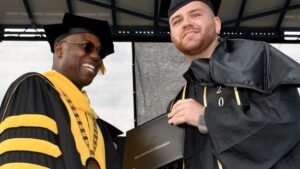Colleges and universities nationwide continue to grapple with demographic shifts, fiscal challenges and the lasting impacts of the pandemic. Against these larger societal forces, many higher education institutions have focused considerable attention and resources on improving access and affordability for their students. Many institutions are providing new opportunities for adult learners, veterans, international students and other previously underserved populations.
While many campuses are increasing the diversity of the student body, not all interested students have benefited equally from the growing access to higher education. Students with intellectual disability attend college at the lowest rate of students from any disability category. Approximately 6.5 million Americans have some intellectual disability, defined as having significant limitations both in intellectual functioning (e.g., reasoning, learning, problem-solving) and adaptive behavior. However, due to minimal college options and lack of awareness, school-age students with intellectual disability are less likely to prepare for and seek higher education.
Further, challenges exist in the workforce. Only 28% of working-age adults with intellectual disability have ever held a job. This situation leaves an astounding number of eager workers on the sidelines at a time when our state and regional economies can hardly afford to overlook any segment of the available workforce. These statistics represent an enormous challenge for colleges and universities and an opportunity.
Broadening access to education for individuals with intellectual disability not only benefits those students but also benefits the greater student body, teaching and learning environments, campuses, communities and the workforce. At Millersville University, where I serve as president, we pride ourselves on our work to expand opportunities for students with intellectual disability.
More from UB: CU Boulder Chancellor DiStefano: Lessons learned from 50 years in higher ed
I often view our approach to inclusive education to the genetics and biodiversity of an ecosystem: A campus flourishes when it is composed of students from different backgrounds, cultures and abilities. Our Integrated Studies initiative stands as a testament to our dedication to inclusivity. In this unique initiative, students with disabilities are not segregated or separated; instead, they are integrated seamlessly into our academic, social and communal fabric. They attend the same classes, live in the same residence halls, dine in the same halls and join the same clubs as their peers.
We do not view them as students with disabilities; they are students, period. As an institution, we recognize that a vital component of students’ reaching their potential is creating a strong sense of belonging for all our students. I have seen the impact of integration reverberate across our campus and witnessed the strong connection and sense of belongingness within our community.

Our commitment to inclusion brings with it some challenges, but these challenges are opportunities for growth and learning. We have embraced the philosophy that providing equal opportunities to all is not about offering special treatment; it’s about leveling the playing field. Our campus mirrors the world into which our students will graduate therefore we must ensure they are well-equipped for the challenges that await them beyond the campus.
Inclusive education is also deeply personal for me. As a grandfather to an autistic grandson, I understand the importance of advocating for equal opportunities. My 14-year-old grandson is very bright and tries incredibly hard at school. We give him as much support and love as possible. Watching him develop has given me a heightened awareness and sensitivity to ensure that we provide support for students with disabilities. These experiences have reinforced my belief that inclusive education is a moral, educational and community imperative.
To my fellow higher education leaders, I urge you to champion inclusive education on your campuses. The most important markers of success are ensuring your senior leadership team is committed to the initiative and your campus is prepared. We need to educate faculty and staff and encourage them to see these challenges not as obstacles but as opportunities to enhance their teaching methods, enrich their own learning experiences and contribute towards a vibrant community.
To learn more, campus leaders can click here to find resources to help expand access to inclusive higher education for students with intellectual disability. Campuses are leaning into this opportunity and developing best practices worth sharing.
Together, campus communities can open the doors wider, break down barriers and create an educational landscape where every learner thrives.








